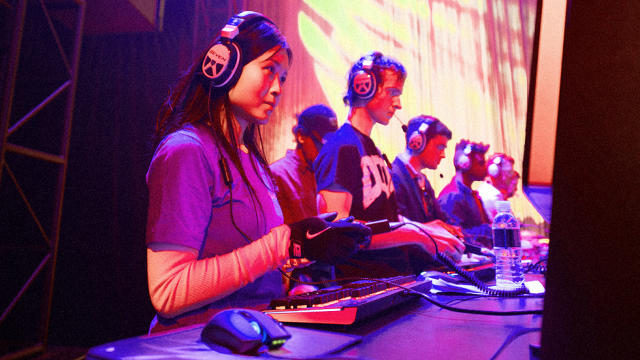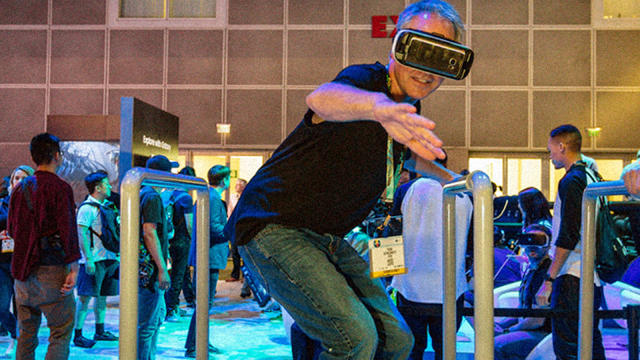At 9:45 a.m. at the Los Angeles Convention Center, the line to enter the South Hall stretches hundreds of feet. There are cosplayers demonstrating unbelievable loyalty to an assortment of video games, advertising industry experts comparing conference swag, and college-age true believers eager for a game development career. Everyone is waiting for the 10 a.m. opening of E3—a massive gaming conference with approximately 50,000 guests.
Later in the day, Yves Guillemot, CEO of Ubisoft, one of the industry’s largest companies, sat down to talk about his vision of gaming’s future. He told Fast Company that he was passionate about the creative possibilities that virtual reality offers for storytelling. Because it gives developers more opportunities to reuse parts to create immersive digital environments, he feels VR can more powerfully draw users into the game. And as virtual reality tech gets better, as he puts it, “We are just at the start of what we can do in virtual reality. You won’t have to go into space—it’s here.” Guillemot cited body language feedback as one of the virtual reality gaming opportunities he’s most excited about as well.
At this year’s E3, gaming is on the cusp of major changes—and not just due to the advent of virtual reality. Nintendo and Sony are about to unveil new consoles, Facebook is about to unleash the VR of Oculus Rift to the masses, and smartphone games are booming. The crowd at E3 was thick with hardcore game aficionados who can talk for days about DLCs (downloadable content), Alienware gaming computers, and the Call of Duty franchise’s smallest details. But one of the biggest changes to the world of video games barely registered at E3.
Chinese gaming giant Tencent had a modest, blink-and-you-miss-it E3 presence. However, outside the walls of the convention center, Tencent was ironing out details of its coming $8.6 billion acquisition of Supercell, the Finnish giant behind the highly popular Clash of Clans series of games, a staggering sum that indicates the transformative changes rocking the industry.
The Golden Age of Freemium Mobile Games
Tencent’s acquisition of Supercell is based on more than just a love of medieval strategy games. Companies like Supercell have perfected a lucrative source of gaming revenue: Phone- and tablet-based games that are free to play charge money for add-ons like extra turns or special character accessories, and maintain an addictive hold on players.
While a glut of freemium games has hurt some developers (Glu Mobile, which markets the highly popular Kim Kardashian: Hollywood mobile game, laid off some employees earlier this year), the genre has never been doing better. According to a report by NewZoo, the size of the global game market is expected to reach $99.6 billion in 2016—and mobile gaming is responsible for approximately $36.9 billion of that.

E-Sports Go Mainstream
At E3, some of the longest lines (and there were plenty of long lines) were seen around live e-sport displays and commentaries by Twitch. Twitch, a live-streaming video game platform owned by Amazon, has landed at the center of a youth culture boom obsessed with all things e-sports.
The e-sport genre, which has players compete in real time in amazingly complicated games that rival chess when it comes to strategic thinking by players—with a hefty dose of precise timing and coordination mixed in—is becoming a massive moneymaker. In a sign of where the money is going, ESPN launched a dedicated e-sports vertical earlier this year.

The Rise of Virtual Reality
One of my first stops at E3 was a VR roller coaster presented by Samsung. The company, whose Gear VR headset is used at several Six Flags amusement parks, installed hydraulic seats in the convention center so visitors could experience the ride for themselves. Around the corner at Samsung’s pavillion, users could strap into virtual skateboards—again using Gear headsets.
Around the rest of the conference, virtual reality was the talk of the town—a big sign of where the category is headed over the next year or two. Game manufacturer Ubisoft was showing off its multiplayer Star Trek: Bridge Crew VR game, Facebook’s Oculus was teasing a series of high-profile, immersive games such as Wilson’s Heart, and Sony was showing off its upcoming, mass-market Playstation VR unit.
But the challenge is that VR is still just a plaything for early-adapter gamers rather than a mass-market phenomenon. Samsung’s Gear VR is hobbled by limited compatibility (users can only use it with a Samsung Galaxy phone) and limited software of interest, the Oculus Rift isn’t shipping to mass audiences until August, and the HTC Vive’s difficult installation and price point limit its interest to a general audience.
Once Playstation VR and Oculus Rift hit the market, game developers are likely to enter into a free-for-all to make compelling virtual reality content. The only challenge is that there’s limited market research, a throw-it-all-at-the-wall-and-see-what-sticks philosophy among game developers, and no apparent Super Mario Brothers or Asteroids to serve as a breakout title that introduces mass audiences to VR.
In the meantime, though, every company at E3 is hoping it has the next big thing. And a few of them just might be right.
Related Video: Will V.R. Go Mainstream?
Fast Company , Read Full Story
(17)